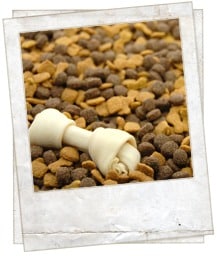 Dogs are just as different as people when it comes to breeds, sizes, shapes, personalities and needs, especially with respect to dog food nutrition. Two dogs from the same litter may be as dissimilar from each other as chalk and cheese and need completely different feeding, handling, rearing, and training. Dogs grow up and adapt to their environment, but they also have their own unique personalities. This is why one dog that has been abused may go on to be a loving family dog and another may turn so aggressive there is no choice but to put him down.
Dogs are just as different as people when it comes to breeds, sizes, shapes, personalities and needs, especially with respect to dog food nutrition. Two dogs from the same litter may be as dissimilar from each other as chalk and cheese and need completely different feeding, handling, rearing, and training. Dogs grow up and adapt to their environment, but they also have their own unique personalities. This is why one dog that has been abused may go on to be a loving family dog and another may turn so aggressive there is no choice but to put him down.
Although their specific needs are different all dogs need the basic essentials of warmth, love, food and training, and how an individual owner goes about providing these things will be tailored to suit both dog and owner. For example a husky, or other snow dog, will require no where near the amount of warmth that a poodle will, although it will need a lot more fat and protein in its diet to maintain its body temperature.
This is just an example of how every dog’s need is different to the extreme that what is essential for one dog can kill another. That is why there is no absolutely across the board calculation to determine how much of what food ingredient is perfect for proper dog food nutrition.
Many people say that the need for carbohydrates in a dog’s food is non-existent, although in the right quantities they can be a good source of energy. However they are often used as cheap fillers and give the dog no benefits that could not have been obtained from elsewhere.
In this case, when looking for a food for your dog, do not be instantly put off by the inclusion of things such as cereals and grains (they will always be present in kibble, even in the best dry dog food) but check up on how much is present. If there are no conclusive figures on the packet or online, phone the supplier. If they make it hard for you to get an answer the chances are they don’t want you asking too many questions. Cross them off your buyer list, as a company with nothing to hide will be open and helpful.
Looking for a dog food rating on the web can be a good place to start before you buy dog food that may not be right for your pet. This can give you an idea of the quality of the brand, although to be sure of adequate dog food nutrition levels, we suggest you use independent websites that are not sponsored to promote a certain dog food online.
Dogs that need to put on weight will need extra carbs, as do some with specific complaints. However, as main dog food ingredients go, carbs, grains and cereals should be avoided as much as possible. For adequate dog food nutrition, ideally a food should only have between 15-20% carbs. Cheap dog food often has a ratio much closer to 40-50% and even up to 70%.
Protein is the essential part of your dog’s diet, but the quality of it is equal to, if not more important than, the percentage itself. Too much protein can be just as harmful as too little. Again, the percentages are completely dependant on the individual dog in question, but for example a puppy should have around 28% protein in it’s food, an adult 18%, a performance dog should have 25%, a sled dog 35% and a lactating bitch should have 28%.
The fat quantities run as follows: puppy 17%, adult 9-15%, performance dog 20%, racing sled dog 50% and a lactating bitch 17%.
As you can see the quantities vary greatly depending on the activity level of the dog but things such as illness can lower or increase the amount needed by dogs significantly.
Vitamin A, Vitamin D, Vitamin E, Vitamin K, Vitamin B1 (thiamin), Riboflavin, Vitamin B6, Niacin, Pantothenic Acid, Vitamin B12 and Folic Acid are all essential vitamins for your dogs. In a high quality dog food these should be added in the right quantities, as an excess of certain vitamins can be harmful, even lethal, for your dog and should you suspect a deficiency or excess you should talk to your vet as soon as possible.
Calcium, Phosphorous, Magnesium, Sodium, Potassium, Chlorine, Iron, Copper, Zinc, Manganese, Selenium and Iodine are the twelve essential minerals for your dog.
All these vitamins and minerals are essential for your dog’s health and they should be consumed every day to keep the dog healthy. However, a well-balanced food will contain the correct amounts and, provided you are using such a food, dog food nutrition should not be a problem. You should be careful not to give your dogs supplements unless told to do so by a qualified vet.
For more information about Dog Food Dangers and Dog Health, check out the highly recommended The Complete Guide To Your Dog’s Nutrition today!

